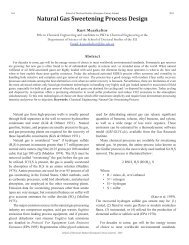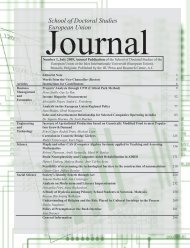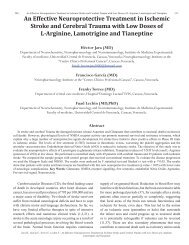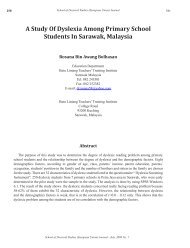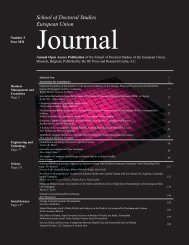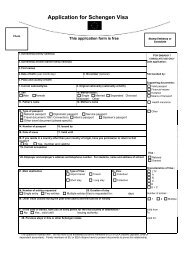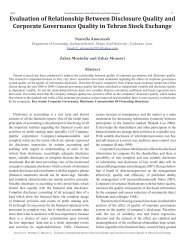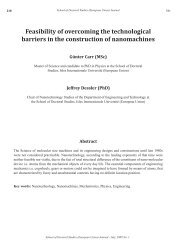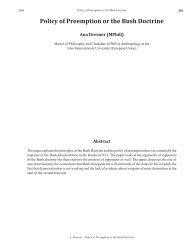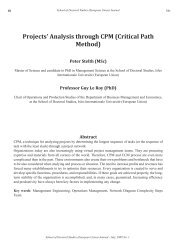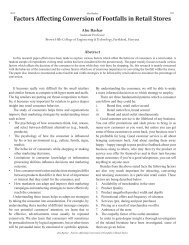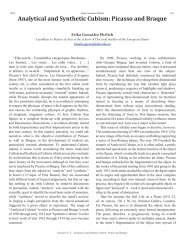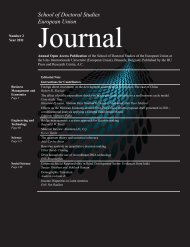Iiuedu.eu
Iiuedu.eu
Iiuedu.eu
You also want an ePaper? Increase the reach of your titles
YUMPU automatically turns print PDFs into web optimized ePapers that Google loves.
2011 Institutional Infrastructure and the Adoption of International Financial Reporting Standards (IFRS) in Nigeria17Institutional Infrastructure and the Adoption ofInternational Financial Reporting Standards (IFRS) inNigeriaIyoha, F.O.Lecturer, Department of AccountingCollege of Development Studies, Covenant University P.M.B 1023Ota, NigeriaEmail: iyohafrancis@yahoo.co.ukJafaru JimohDepartment of Accounting Auchi PolytechnicAuchi, NigeriaAbstractNigeria has officially indicated her intention to adopt International Financial Reporting Standards (IFRS) from year 2012. Thougha welcome development, it raises the question of the country’s availability and readiness of relevant and appropriate institutionalinfrastructure. Using the perception of users and preparers of accounting information, the results of the descriptive study showed thatonly the professional accounting bodies have the relevant infrastructure to cope with the adoption of the IFRS. The study recommends,amongst others that the activities of the major institutions connected with the implementation of the new standard be urgently reviewedand that the education, sensitization, and communication to stakeholders of issues associated with IFRS adoption vis a vis the role ofthe relevant institutions should commence in earnest and finally a rigorous IFRS capacity building program should be embarked uponby all regulatory bodies, firms and training institutions in order to provide the needed manpower for IFRS implementation. Key words:International Financial Reporting Standard, Institutional infrastructure, Capacity building, Adoption, Nigeria Accounting StandardsBoard, Relevance, Reliability, Comparability.There is a growing demand for credible financialinformation to meet the needs of stakeholders who haveoperational interest in financial reporting. Informationemanating from financial reporting is regarded as credibleand useful when it faithfully represents the “economicsubstance” of an organization in terms of relevance,reliability and comparability (Spiceland, Sepe andTomassini (2001:36). It is in recognition of the need to havequality financial reports that the adoption of InternationalFinancial Reporting Standards (IFRS) is taking firm rootamong countries around the world. One of such countriesis Nigeria which has officially expressed her intention toadopt IFRS as from 2012. This position, however, is withoutprejudice to a host of banks in Nigeria which have alreadystarted to adopt IFRS. Though this might be regarded as awelcome development, the question that begs for answeris, does Nigeria have strong institutional infrastructure tomake the transition to IFRS (a more conceptual approach tofinancial reporting) effective and rewarding? The questionis pertinent because IFRS is an innovation which requiresinstitutional infrastructure to succeed not only at thedevelopment phase, but also during the implementationphase. This study, with particular focus on Nigeria, isimportant because institutional constrains vary from countryto country in their impact on organizations (Commanderand Svejnar, 2007) and the situation in Nigeria cannot betaken for granted.The objective of this article is therefore to address thequestion of whether Nigeria has the required institutionsto support the adoption of IFRS from the perspective ofusers and preparers of financial reports. The remaining partof this paper is organized as follows: Section 2 describesthe institutional and infrastructural/ legal requirements forfinancial reporting in Nigeria. Section 3 is a review of recentIyoha, F.O., Jimoh J. - Institutional Infrastructure and the Adoption of International Financial Reporting Standards (IFRS) in Nigeria



